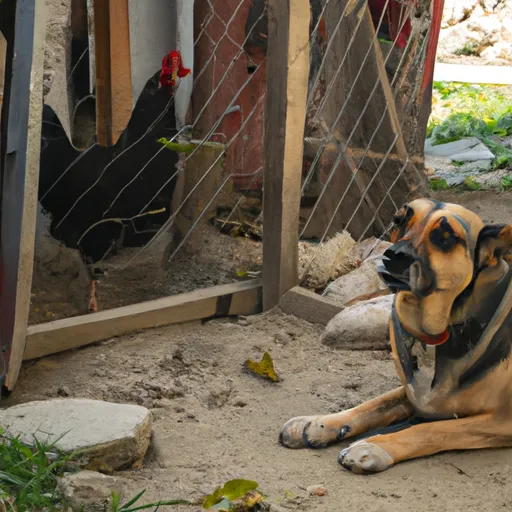Top 5 Chicken Predators and How to Protect Your Flock
Chickens are delicious, but they’re also vulnerable.
If you have a backyard flock, it’s essential to know the most common chicken predators and how to protect your birds from them.
Here, we’ll cover the top five chicken predators and provide tips on how to keep your flock safe.
Introduction to Chicken Predators
The first step in keeping your chickens safe is understanding which animals pose a threat.
Here are some of the most common chicken predators:
1. Raccoons – These omnivores love eggs and chicks, and they can be fierce when defending their meal. They often attack at night and can cause significant damage to your coop and flock.
2. Foxes – Foxes are skilled hunters that will prey on chickens if given the opportunity. They typically hunt during dawn or dusk and can kill multiple birds in one attack.
3. Hawks – While hawks don’t usually target adult chickens, they love to snatch up small chicks. Keep an eye out for these aerial predators if you have young birds.
4. Opossums – Although opossums aren’t typically seen as threats, they can climb trees and raid nests for eggs.
5. Dogs – Unfortunately, not all dogs are friendly towards chickens. Some may see them as prey and attack without provocation.

The Most Common Chicken Predator
Raccoons are by far the most common chicken predator.
They’re intelligent, adaptable, and strong enough to break into even well-secured coops.
To prevent raccoon attacks, make sure to secure any potential entry points and install motion-activated lights to scare them off.
You can also use natural repellents like:
- cayenne pepper
- vinegar to deter them
See also Chicken Entertainment Hacks: Making the Most of Your Coop with DIY Toys and Activities
The Predator that Kills but Doesn’t Eat Chickens
While most predators attack chickens for food, there’s one animal that kills them just for fun – the domestic dog.
Dog attacks are a leading cause of chicken deaths, especially in rural areas where roaming pets are common.
To protect your flock, make sure to supervise any visiting dogs and consider building a separate enclosure for your chickens.
Identifying Raccoon Damage to Your Flock
If you suspect raccoons are attacking your chickens, look for signs of damage such as torn-up nesting materials, broken eggs, and missing birds.
Raccoons tend to attack at night, so try setting up trail cameras to catch them in action.
Animal Protectors of Chickens
While many animals view chickens as prey, others see them as friends.
For example, guardian dogs and cats can help protect chickens from predators like foxes and hawks.
Geese are another effective protector; they’re known for being aggressive and will honk loudly to alert other birds of danger.
The Number One Killer of Chickens
Surprisingly, the number one killer of chickens isn’t a predator – it’s a disease.
Poultry diseases like avian flu and Marek’s disease can wipe out entire flocks quickly.
Make sure to vaccinate your birds regularly and practice good biosecurity measures like washing your hands before handling them.
Using Lights to Deter Predators
Lights can be an effective way to deter predators since they disrupt their nocturnal behavior.
Red light is particularly useful because it doesn’t attract insects like white light does.
Consider installing red LED bulbs around your coop to keep predators away.
See also The Most Common Chicken Predators: Identify and Protect Your Flock
Red Light as a Deterrent for Predators
Red light works by interfering with predators’ circadian rhythms, making them less likely to attack. It’s also less visible than white light, which makes it ideal for use near windows or doors where you want privacy.
Can Chickens Defend Themselves Against Dogs
While chickens aren’t equipped to fight off large predators like dogs, they do have some self-defense mechanisms.
When threatened, chickens will puff themselves up to appear larger and clap their wings to create noise.
They may also run in circles or charge at the attacker. However, it’s still best to supervise any visiting dogs and take steps to protect your flock.
Will a Fox Come Back After Killing Chickens
Foxes are opportunistic predators that will return to a site where they successfully killed prey. If a fox has attacked your chickens once, it’s likely to come back again unless you take steps to deter it.
Consider installing motion-activated lights, using natural repellents, or bringing in a guardian animal to protect your flock.
Making a Predator-Proof Chicken Yard
To keep your chickens safe, it’s essential to create a predator-proof yard.
This includes securing any potential entry points, installing wire mesh over windows and vents, and burying hardware cloth underground to prevent digging.
You should also prune trees and shrubs to eliminate hiding spots and remove any sources of water that could attract predators. With these tips, you can keep your chickens safe from harm and enjoy fresh eggs for years to come.
